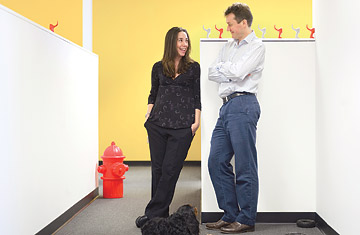
Natasha and Chris Ashton can't stop talking about Fetch Inc., their pet-insurance firm.
This is not your mother and father's mom-and-pop outfit. About four years ago, when their daughter Juno was on the way, investment banker Adam Adelman and composer Belinda Takahashi, both 38, of Fairfax, Calif., were shopping for music DVDs for the baby. Takahashi was appalled by the synthesized classical music they heard on one DVD about creating music. "We can do better," she said. It was the birth of an idea, not to mention the arrival of an actual child. Juno Baby, their educational-DVD, apparel and toy company for children under 5, launched in mid-2006. "Her passion was for the idea and the music," Adelman says. "My passion was the excitement of building a company." Juno the child is now advancing through preschool.
And so another couple joins the ranks of co-preneurs, the buzzword for co-owners of a business who share a personal life. The increasing number of women in the workplace, corporate downsizing and better small-business technology are feeding the phenomenon's growth, says Jean Charles, author of Couplepreneurs: Prosperity Through Partnership.
Young co-preneurs share a disenchantment with the corporate world, having grown up witnessing the triumphs of young high-tech hotshots. And the resurgence of venture capital after the dotcom bust has seen a corresponding surge of interest in co-preneurism, says Lawrence Gelburd, who teaches entrepreneurship at Wharton. "It's sexier and hotter," he says, "to run a business together now."
Family-friendly lifestyles and a sense of mission fuel the aspirations of many of these couples. Yanik Silver, 33, of Potomac, Md., started SurefireMarketing.com a publishing company, in 2000, and his then fiancé Melissa, 35, soon joined him. "I was wildly in love, and I wanted her with me," he says. When their son Zak was born, they shared child care. The "Internet lifestyle" their site promotes, Silver says, is partly about "the opportunity to stay home and watch your kids grow up."
The egalitarianism of these pairs, while not total, may give them an edge in avoiding gender-role traps. Elisabeth and Michael Garson, 33 and 35, scrapped their first joint venture, an ad agency, she says, "because someone had to be in charge, and we fought." When the Philadelphia couple founded Living Wage Clothing, a high-style T-shirt company that pays foreign workers fair wages, the business divided naturally into equal responsibilities, with realms assigned according to temperament and ability. Ms. Garson handles the look of the product, advertising and communications; Mr. Garson oversees legal and fair-trade issues and manufacturing.
Complementary skills and roles are key, which means the old saw about opposites attracting in love can work double-time for co-preneurs. After analyzing the genetic profiles of the dating site Chemistry.com Rutgers University anthropologist Helen Fisher concluded that people are more attracted to those with different balances of dopamine, serotonin, estrogen and testosterone. "And the same drive to find people who are complementary also operates in business," she says .
Another boundary that young co-preneurs flout is the one between labor and love. After a sick cat and a $5,000 veterinary bill gave Chris and Natasha Ashton, 34 and 32, the idea for their pet-insurance company, Fetch Inc., the English couple, now Philadelphians, have talked nonstop about it, boring their friends to stupefaction. Four years later they are selling their policies to pet owners and corporate benefit plans. And still yapping like Yorkshire terriers. "We know we should have boundaries," she says, "but we don't. It's business morning till night, but it's so exciting, we don't think of it as work."
Still, that much can sometimes be too much, says Maja Drolec, 28, a Babson College M.B.A. student who teamed up with her boyfriend Mihael Mikek, 31, to start FunkyCall.com a service providing recorded greetings and mobile voice campaigns. "I hate to differentiate life into business and pleasure," she says, "but some months our relationship feels like too much business." Yet when the business goes well, Mikek says, it charges up their romance.
Ah, young love, so oblivious to the grim statistics of romance, which doom almost as many couples as businesses. During five of their 10 years together running a restaurant consultancy in New York, Sam Firer, 44, and Steven Hall, 47, were live-in lovers. At some point, Firer says, "We talked all day long to each other and at the end of the day had nothing left to say." They parted as a couple but still work closely together. "We have a much better relationship now," says Firer.
While most couple-owned businesses implode after a divorce, others, amazingly, continue to thrive--and not just in terms of the bottom line. Family therapists Pat Cole and Kit Johnson, professors at Nova Southeastern University and Capella University, respectively, identified several common factors that help busted couples succeed at business. Perhaps most important was mutual trust. A "curious" finding, say the professors. A possible explanation: their ability to compartmentalize their business and personal lives. After the breakup, they still loved their "baby."
For Judy Rosenberg, 59, and her ex-husband Eliot Winograd, 60, their offspring is Rosie's Bakery, a Boston chain of six bakery cafés. Their romance lasted five years and their marriage only two, but their partnership has endured nearly 30. Their marriage foundered, she says, over boundary issues: she has none, he has many. But in business they complement each other. She is the baker/artiste; he is the operations wizard. "Both of us were integral parts of the business," she explains, adding, "I enjoy our partnership so much now. Eliot and I have this 'baby.'" Maybe for some couples, the business was always the real romance.